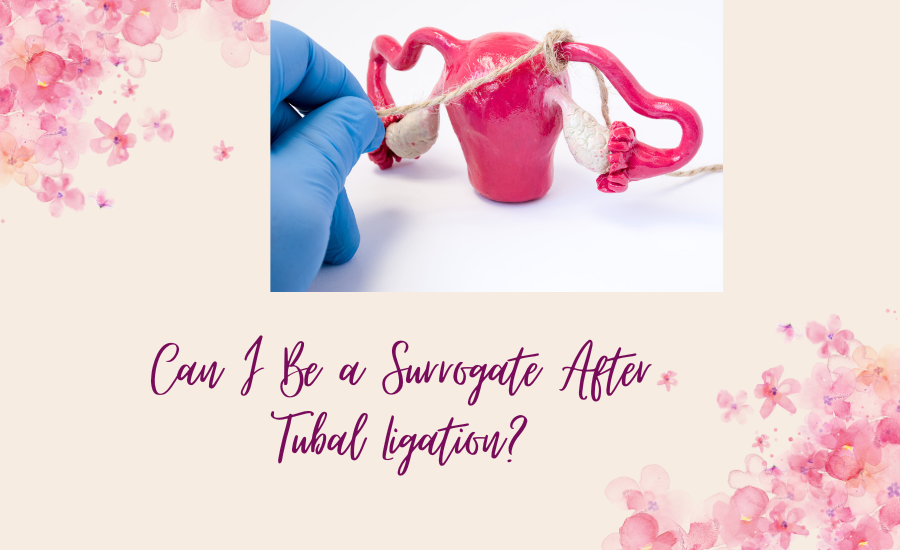Can I Be a Surrogate After Tubal Ligation- Your Guide For Surrogacy Process

Are you thinking about being a surrogate but worried your tubal ligation means you can’t? Don’t worry! You can be a surrogate even after having your tubes tied. We will look at how this affects your surrogacy journey. This includes what you need medically and legally.
Thinking about helping someone have a family can feel overwhelming. But, we’re here to help. We’ll explain how gestational surrogacy, egg donation, and in vitro fertilization (IVF), work. This guide will help you understand your choices for helping others have a child.
So, let’s answer the big question: Can I be a surrogate after tubal ligation? Yes, you can help a family grow, even if you’ve had your tubes tied before.
Key Takeaways:
- Tubal ligation doesn’t stop you from being a surrogate. The womb is still good for the embryo.
- In gestational surrogacy, you use eggs and sperm from the parents or donors. Your own fertility doesn’t matter.
- Agencies have rules, but having your tubes tied isn’t usually a problem.
- For a surrogate with tubal ligation, processes are the same as for any other. This includes health checks and legal steps.
- If you’ve had your family already, being a surrogate could be even more meaningful to you.
Get in touch for FREE SURROGACY CONSULTING:
Mobile: +91-8800481100 ( WhatsApp, Line, Viber)
Email: neelam@ivfconceptions.com
Understanding Tubal Ligation and Surrogacy
To grasp the chance of being a surrogate post-tubal ligation, understanding the surgery is crucial. It’s vital to know how it affects fertility.
What is Tubal Ligation?
Tubal ligation is a way for women to prevent pregnancy. Doctors either cut, tie, or close the fallopian tubes. This stops the egg from the ovaries from reaching the uterus, preventing conception.
How Does Tubal Ligation Affect Fertility?
Tubal ligation stops a natural pregnancy but does not affect the overall ability to have children. A woman’s body can still release eggs. Her uterus is still a good place for an embryo to grow and develop.
What is Gestational Surrogacy?
Gestational surrogacy is when a woman carries a baby created from someone else’s eggs or sperm. The baby is usually from the intended parents or donors. This makes the surrogate’s tubal ligation status unimportant in surrogacy setups.
Knowledge of these topics opens up the idea for women who have had tubal ligations. They can think about being a gestational surrogate to help with family-building options.

Can I Be a Surrogate After Tubal Ligation?
Yes, you can still be a surrogate even after tubal ligation. Gestational surrogacy does not require the surrogate’s eggs. The embryo comes from the parents or donors through IVF. So, the main thing is the health of the uterus. It must be ready for the embryo to grow, despite past tubal ligation.
Importance of Uterus in Surrogacy
In gestational surrogacy, ensuring a safe space for the embryo is key. The surrogate’s own eggs are not needed, so previous tubal ligation doesn’t matter. As long as the uterus is well, being a surrogate is very possible.
Surrogacy Process for Tubal Ligation Patients
The process for surrogates with tubal ligation is just like for others. They have to pass medical and mental checks, meeting all their needed can i be a surrogate after tubal ligation? Rules. Then, they’ll join with their parents, and the IVF embryo transfer process starts. The goal is to keep the uterine environment healthy for the embryo to settle and grow.
| Key Factors in Surrogacy After Tubal Ligation | Explanation |
| Uterus Function | The surrogate’s uterus must be healthy and capable of supporting a pregnancy, regardless of tubal ligation status. |
| Egg Source | In gestational surrogacy, the surrogate’s eggs are not used. The embryo is created using the intended parents’ or donor’s eggs and sperm. |
| Screening Process | Surrogates with tubal ligation must undergo the same comprehensive medical, psychological, and background checks as any other surrogate candidate. |
Advantages of Becoming a Surrogate After Tubal Ligation
If you’ve had your tubes tied, becoming a surrogate brings many advantages. You can focus completely on helping another family and not worry about your own fertility. Also, you face no chance of unexpected pregnancy.
 Family Planning Completed
Family Planning Completed
Tubal ligation means your family planning is over. You can help a family without anxiety over your ability to have kids. This dedication lets you support the surrogacy process fully, without your worries.
- No Risk of Accidental Pregnancy
Becoming a surrogate post-tubal ligation means no surprise pregnancies. With your tubes tied, conceiving naturally is impossible. This assurance lets you concentrate on the embryo you’ll carry through IVF.
The benefits of surrogacy after tubal ligation are clear. They appeal to those certain their families are done.
Eligibility Criteria for Surrogates with Tubal Ligation
Becoming a surrogate is a big decision that can change lives for the better. Surrogacy agencies set up robust surrogate eligibility criteria to make sure everything goes well. Even if a woman has had a tubal ligation, which is also known as having “tubes tied,” the rules are mostly the same for her too.
- Age and Health Requirements
For surrogates in the United States, the age is usually between 21 and 45. Their BMI must be under 36. Being mentally and physically healthy is a must. They should not have any serious health issues or mental health problems. This could affect their surrogacy qualifications. A medical check is done to make sure they meet these age and health requirements.
- Lifestyle and Background Checks
Surrogates also face lifestyle and background checks. It’s to be certain they’re both emotionally and financially ready. They have to be drug and smoke-free. Also, they must have a secure place to live and prove they can manage the surrogacy’s challenges. Their personal, work, and criminal histories are thoroughly checked too. This confirms they meet the eligibility criteria.
Additional Guides for Surrogate Mother:
Find a Surrogate Mother With or Without an Agency
In Which Country I Find Low-Cost Surrogate Mothers (in 2023)?
How can I Find a Surrogate Without Agency
What is the Age Limit for Surrogate Mothers
How Much Does Surrogacy Cost Using Family Member
How to Start the Gestational Surrogacy Process? A step-by-step guide for Beginners
How Much Does Surrogacy Cost? Everything You Need To Know (in 2023)
Steps to Becoming a Surrogate After Tubal Ligation
If you’ve had tubal ligation, you might think becoming a surrogate is hard. But, it’s doable with the right help. The first thing to do is find a trusted surrogacy agency. A good agency will know how to work with women in your case.

Finding a Surrogacy Agency
It’s key to choose the right surrogacy agency. You should pick one that’s good at surrogacy cases after tubal ligation and has made successful matches before. They will help with the whole process, from the application to finding a match and making sure you fit the eligibility criteria.
- Medical Screenings and Legal Processes
After picking the agency, you’ll have to go through several medical screenings. These tests verify if you can have a healthy pregnancy. They include a health check, mental health check, and tests on your fertility. The agency will also explain the legal process, which involves making a contract and handling other legal paperwork.
- Matching with Intended Parents
Once you’re cleared medically and legally, the agency will find the intended parents for you. They look at things like what you want, the parents’ wishes, and if you can work well together. The agency will keep communication open during this critical phase.
 Conclusion
Conclusion
In conclusion, women who’ve had their tubes tied can still help as surrogates. This is possible through gestational surrogacy. The key is that tubal ligation only stops natural births. It doesn’t affect the uterus’s readiness for a pregnancy via in vitro fertilization (IVF).
Considering surrogacy options post-tubal ligation is a real possibility. Working with a good surrogacy agency helps manage medical and legal needs. It also aids in finding the right parents to start the surrogacy journey, offering a fulfilling alternative to starting a family.
Having had a tubal ligation does not mean being a surrogate is off the table. It’s crucial to know that the uterus, not the fallopian tubes, carries the baby in surrogacy.
With this understanding, potential surrogates can move forward with confidence. They can explore and seize this chance to make a significant difference in someone’s life.
If you’d like to learn more about IVF, Egg Donation, or surrogacy Consulting services globally, check out the rest of our website at IVF Conceptions. We offer legally secure and affordable surrogacy consulting services for FREE.
Our team has over 14 years of experience facilitating surrogacy arrangements, egg donation, and serving as an advocacy resource for infertile couples and LGBTQ individuals seeking to build families. Till now we have helped and supported thousands of the intended parents with their family-building journey, and we can help you as well. Happy to share the references from the past IPs if needed.
Mobile: +91-8800481100 ( WhatsApp, Line, Viber)
Email: neelam@ivfconceptions.com
Web: www.completesurrogacy.com
FAQ
 Can I be a surrogate after tubal ligation?
Can I be a surrogate after tubal ligation?
Yes, you can still be a surrogate after having your tubes tied. The ability to carry a baby is the most important part. It does not matter if your tubes are tied.
What is tubal ligation and how does it affect fertility?
Tubal ligation is a surgery that closes the fallopian tubes. It stops natural pregnancy by blocking the travel of eggs to the uterus. However, it doesn’t stop your uterus from working with IVF to carry a baby.
What is gestational surrogacy?
Gestational surrogacy is when a woman carries a baby with someone else’s genetic material. This is done through IVF. The eggs and sperm are not hers, so tubal ligation doesn’t matter.
What are the advantages of becoming a surrogate after tubal ligation?
Becoming a surrogate is easier if you have already decided not to have more kids. It won’t affect your own fertility. Plus, you won’t worry about getting pregnant by accident.
What are the eligibility criteria for surrogates with tubal ligation?
To be a surrogate, you must be 21-45 and meet certain health standards. This includes having a healthy weight and lifestyle, being financially secure, and having at least one child. You will also have medical and emotional tests to check if you’re ready for surrogacy.
What are the steps to becoming a surrogate after tubal ligation?
First, find a trusted surrogacy agency. They will help you with paperwork, matching, and support. The agency will also make sure you are ready medically and legally for surrogacy.
Source Links

 Family Planning Completed
Family Planning Completed Conclusion
Conclusion